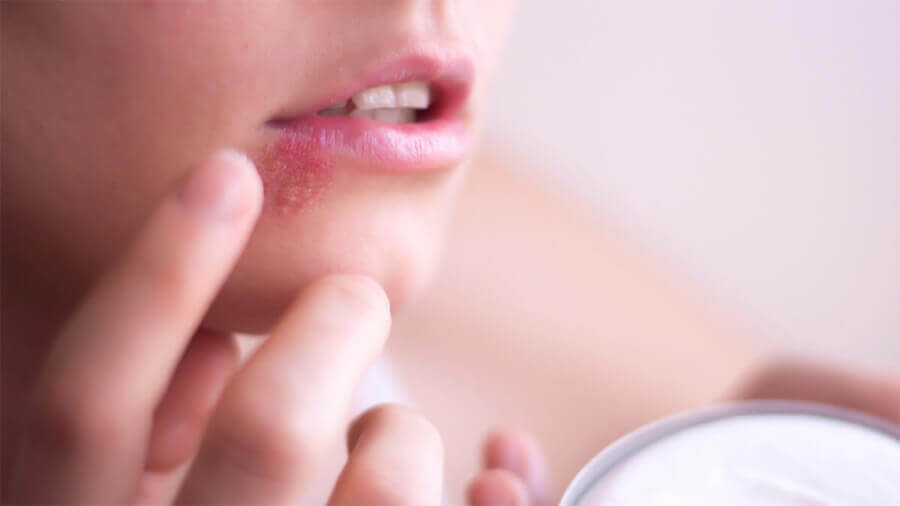What Causes Cold Sores:
And The Most Common Symptoms


If you suffer from cold sores, you’ll know just how uncomfortable they can be! But what are they? Here, we’re taking a look at what causes cold sores, cold sore symptoms, and how to stop them from spreading.
What Are Cold Sores?
Although cold sores are extremely common, many people may not know that they are caused by a virus called herpes simplex virus (HSV for short). There are two different types of HSV, both of which can cause cold sores.
Type 1 (HSV 1) is thought to be responsible for more than 90% of cold sores, while Type 2 (HSV 2) generally causes genital herpes but it can also cause cold sores if it infects the skin around the mouth.
Herpes simplex virus is highly contagious and is spread through skin-to-skin contact. Unfortunately, there is no cure for HSV just yet, so if you have had one cold sore, it’s likely that you will have more. This is because the virus that caused the first cold sore will lie dormant in the nerve cells in that area of your skin (usually around the lips). This means that it can potentially cause infection again in the future. It also means that you’re likely to experience cold sores in the same spot during each flare-up.
What Are The Most Common Cold Sore Symptoms?
Now that we know what causes cold sores, let’s take a closer look at the symptoms. Generally speaking, they appear as small blisters on the skin, and they can be quite itchy or painful. Cold sores on the lip are perhaps the most common, but cold sores on the nose and cheeks are not uncommon.
There are some tell-tale signs that a cold sore is brewing which can help you catch it early and start treating it. Here are the most common symptoms:
- A tingling or itching sensation around the lip
- Redness or swelling that may look like a pimple starting to form
- Throbbing, soreness or a burning sensation around the lip
As we mentioned before, cold sores tend to pop up in the same spot each time. Therefore, if you experience any of these tell-tale signs in that particular spot, it can be a strong indication that one is on the way.
How long do cold sores last? Whilst it will differ from person to person, they tend to take 7-10 days to heal on their own.

What Causes A Cold Sore Flare-Up?
Cold sores can reappear at any stage, once you have already been infected with HSV. However, certain situations may trigger a flare-up of symptoms. Some of the most common triggers are:
- Feeling unwell with a viral infection or a fever
- Stress
- Fatigue
- Hormonal changes, such as the start of your period
- Changes to the immune system
- Dry, chapped or irritated lips
- Exposure to sunlight and wind
Prevention is always better than cure, especially when it comes to cold sores. That’s why we suggest getting to know your triggers and avoiding them. For instance, you may notice that you tend to get cold sores when you’re feeling stressed. In this case, you should invest some time into learning stress management techniques. Or, if you tend to get cold sores when your lips are dry and chapped, you may want to invest in a good lip balm, especially in the winter months.
How Do You Stop A Cold Sore From Spreading?
Cold sores are extremely contagious, but there are some very simple things that you can do to avoid spreading the virus to other areas of your body or to your loved ones.
- Try not to touch or pick blisters/sores
- Avoid skin-to-skin contact, such as kissing and oral sex – (both HSV 1 and HSV 2 can spread to the face (causing cold sores) or genitals (causing genital herpes).
- Avoid sharing items that have come into contact with the cold sore – don’t share water bottles, eating utensils, towels, lip balms etc.
- Wash your hands immediately after applying cold sore cream or touching the blister/sore
Whilst HSV infections can cause discomfort, they do not usually cause any serious health conditions. However, it is worth noting that HSV can potentially be very serious for people who have weakened immune systems (immunocompromised). Therefore, you should be especially careful not to pass on the virus.
Similarly, you should be extremely cautious around babies and young children if you have an active cold sore. This is because babies are at risk of neonatal herpes, a potentially life-threatening condition. Thus, you should never kiss babies or young children when you have a cold sore.
Repeat Prescription
Cold Sore Treatment
How To Order A Prescription For Cold Sore Treatment
You can easily request a prescription via our online Cold Sore Treatment prescription service. Through this service, you can request a prescription for antiviral medication that will help ease cold sore symptoms and clear flare-ups faster. This medication reduces the severity and duration of flare-ups by preventing the HSV from multiplying.
To request a prescription, you just need to fill in a short and secure questionnaire – there’s no need to make an appointment with a GP. Then, one of our Irish-registered doctors will review your request to make sure it is medically safe and suitable for you. Once your request has been approved, we will send it directly to an Irish pharmacy of your choice using secure Healthmail.
If you have any questions or concerns about this Cold Sore Treatment prescription service or how the medication works, you can simply book an online video consultation with one of our experienced GPs. There, we can talk you through the treatment and answer any questions you may have.
How It Works

Step 1
Online Questionnaire

Step 2
Medical Review
